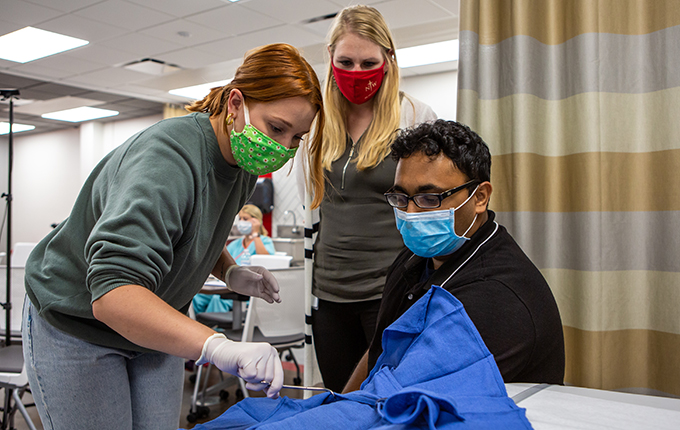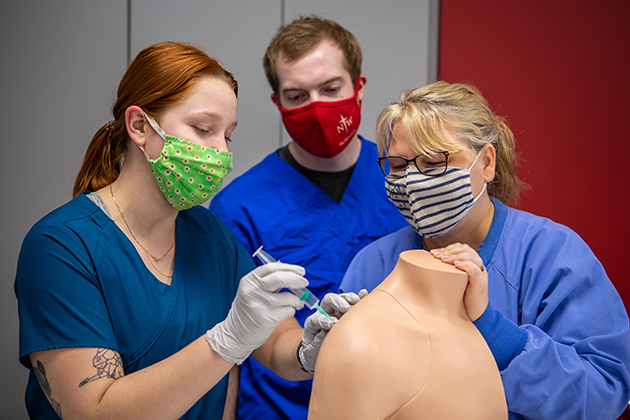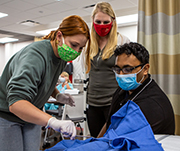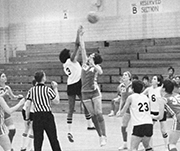Meeting a Need
24 students enroll in Northwestern’s first class of physician assistants
BY ANITA CIRULIS

LEM MAURER
Jill Van Otterloo, a professor of practice in Northwestern’s new physician assistant studies program, watches as Noelle Berg prepares a sterile field on classmate Jerry John.
Megan Stahl decided she wanted to become a physician assistant—or PA—while doing medical mission work in Nepal.
“I worked with a PA there and just really loved the sense of teamwork,” she says. “You get to work with nurses and doctors and be part of an awesome medical decision-making team.”
When Stahl applied to PA master’s degree programs, she was accepted into several but chose the new program starting at Northwestern College. As a small-town girl herself, she loved Orange City and was drawn to the sense of community she felt when she arrived on campus for her interview.
“But the faith part of it was really why I came to Northwestern,” Stahl says. She earned her undergraduate degree at a church-related college, “but I never had [an education] where you can pursue your faith while you’re pursuing your degree. It’s just incredible.”
Stahl is one of 24 students who are part of the first PA cohort at Northwestern, and she’s not the only one drawn to the program’s combination of biblical teaching with a medical curriculum. Jerry John moved to Iowa from the Dallas, Texas, area. The 33-year-old has a background in the sciences, having worked in clinical research and as a medical scribe for a nephrologist.
“I was looking for a Christian college or university,” John says. He discovered Northwestern on CASPA, the Centralized Application Service for Physician Assistants. “I liked the faith integration of the program’s vision statement, so I did some research.”
“There aren’t a lot of PA programs that are integrating faith with their curriculum,” says Dr. Christina Hanson, the director of Northwestern’s physician assistant program. “But for many PAs, that’s a big part of why they go into the profession. There are a lot of Christians who feel called to health care and want to learn in that model.”
Northwestern’s faith-based approach also convinced Dr. Alan Laird ’82 to join the program as its medical director. In his other role as chief medical officer for the Orange City Area Health System, Laird knows firsthand the shortage of health care workers, especially in rural areas.
“We, as every place in the nation, are struggling to recruit doctors,” he says. “The need for physicians only continues to grow as our population grows and ages.
“PAs are trained with the expectation that they will be part of a medical team, but able to act independently and to treat patients in their area of expertise. They provide high-quality medical care and access for times when a physician intervention isn’t required.”
Laird praises the dedication of students in Northwestern’s first cohort. They range in age from their early 20s to 42, and for many, becoming a PA is their second or third vocation.
Ashley Hazeman of Winona, Minnesota, is among those making a career switch. She majored in psychology in college, earned a master’s degree in counseling, and worked as a counselor and as a therapist for children with autism.
“I’ve always been interested in health care,” she says, “but when I was in college, I didn’t have a lot of self-confidence to think I could do the hard science classes.”
A desire to do more for her community led to her return to school.
“I have patients come in all the time and tell me that they can’t find a psychiatrist,” Hazeman says. “Being a psych PA has a lot of aspects that I like about being a counselor, like the diagnosis and treatment plans, while also adding the medicine piece. I can use the skills I learned as a counselor in my job as a PA.”
In preparation for applying to PA schools, Hazeman took college courses on the side to fulfill prerequisites. The timing of her acceptance into Northwestern’s PA program, she believes, is part of God’s plan. “It’s within driving distance of home, and I could tell it was going to be a really supportive community for me,” says the wife and mother of a 12-year-old daughter and 8-year-old son. “This is a big change for my family. My kids only see me on weekends.”
Derrick Moss ’12 is also making a career change. The Northwestern grad worked six years for NWC as the head athletic trainer for Raider athletic teams. For nearly that long, he also thought about becoming a physician assistant. “I have a passion for working with others,” he explains. “I knew being a PA would enhance my opportunities to truly make a difference in someone’s quality of life.”
When his alma mater announced it was starting such a program, Moss—like Hazeman—saw God in the timing. Northwestern’s was the only program to which he applied.
“Having done my undergraduate work here, I knew the kind of academic rigor that Northwestern strives for, and I knew that would be true of the PA program as well,” he says. “I knew I wouldn’t have an issue when it came time to sit for my boards.”
Both Moss and Hazeman appreciate the unique health care experience each PA student brings to the cohort. One classmate was an EKG tech, so when they learned about EKGs, he was the one with expertise in that area; another worked in a cardiology unit and was the “go-to person” when their studies focused on the heart.
“Now we’re transitioning to an orthopedic module,” says Moss. “That’s probably my strongest suit, having done athletic training, so I would expect I will be able to answer questions from my classmates.”
The modular style of learning helps students integrate their understanding from course to course, explains Hanson. All of the medical courses cover the same body system at the same time—an effective learning technique for a program that essentially condenses four years of medical school into 15 months of classroom instruction followed by another 12 months of clinical rotations.
“They warned us it was going to be like drinking from a fire hose,” says Moss. “We get a lot thrown at us really quickly, but I’ve really enjoyed it.” He and the other students in his PA cohort are in class from 9 to 5 Mondays through Thursdays and typically dedicate another four hours to studying in the evening. Exams take place on Fridays.
With such a demanding schedule, the PA students spend a lot of time with their professors and the other members of their cohort. Stahl speaks glowingly of the PA faculty, whom she describes as mentors and friends. Relationships with her fellow students are equally as important.
“It is incredibly overwhelming,” she admits when describing all they have to learn, “but when you’re sitting in VPH, hanging out with people you like, it doesn’t feel like you’re studying 12 hours a day.”
Stahl remembers her professors saying on the first day, “Put your swords down. You’re all here because you deserve to be here. Now is the time to help each other.”
Training for a team-based approach to medicine makes it especially important to practice a team-based approach to learning, Moss says. “We want to get everyone through the finish line to be the best future health care providers they can be.”
After spending more than a year together in intense study, these future physician assistants will scatter across the country to complete clinical rotations in family medicine, internal medicine, general surgery, psychiatry, emergency medicine, women’s health and pediatrics. Only then will they be prepared to take the Physician Assistant National Certifying Exam, and upon passing it, begin to serve patients.
John, a musician who serves as a drumline instructor for the Red Raider Athletic Band, enjoys working with his hands and is drawn to a surgical practice. Stahl is passionate about women’s health. Hazeman is leaning toward either psych or emergency medicine. Moss is gravitating toward emergency medicine or orthopedics.
Whatever they do and wherever they practice, they and their classmates will leave Northwestern prepared—as theologian Frederick Buechner said—for God’s calling on their lives: a vocation where their greatest joy meets the world’s greatest need. 

LEM MAURER
Sandra Muyskens ’92 worked as a physician assistant for 25 years before returning to her alma mater to teach in Northwestern’s new PA program.
Standout Faculty
Northwestern assembled a stellar group of faculty for its master’s degree program in physician assistant studies.
Dr. Christina Hanson, the program director, worked as a physician assistant herself, taught in the PA program of Bethel University, and has a doctorate in education with an emphasis in higher education leadership. Dr. Alan Laird ’82, the program’s medical director, is also the chief medical officer for the Orange City Area Health System.
And while the rest of the faculty include physician assistants who worked in primary care—the emphasis of Northwestern’s program—they also have a wide variety of clinical experiences. In addition to Northwestern alum Sandra (Hurlburt ’92) Muyskens, they include a disease management consultant, a former software development engineer, and an expert in virtual reality teaching and learning for medical school education.
 The 24 students in Northwestern’s first cohort of a graduate physician assistant studies program seek to fill a need for more health care professionals.
The 24 students in Northwestern’s first cohort of a graduate physician assistant studies program seek to fill a need for more health care professionals. Alumna Cora Vander Broek found a home on the stage, and her career has led her to Chicago, Broadway, LA and a Tony Award nomination.
Alumna Cora Vander Broek found a home on the stage, and her career has led her to Chicago, Broadway, LA and a Tony Award nomination. Fifty years after the first athletes found their own uniforms, prepared fields and built equipment, Northwestern’s intercollegiate women’s athletics program has become a powerhouse.
Fifty years after the first athletes found their own uniforms, prepared fields and built equipment, Northwestern’s intercollegiate women’s athletics program has become a powerhouse. A Northwestern icon since 1978, the 4-by-2.5-inch chapel slip continues to help officials track chapel attendance, undeterred by modern technology.
A Northwestern icon since 1978, the 4-by-2.5-inch chapel slip continues to help officials track chapel attendance, undeterred by modern technology.
Classic Comments
All comments are moderated and need approval from the moderator before they are posted. Comments that include profanity, or personal attacks, or antisocial behavior such as "spamming" or other inappropriate comments or material will be removed from the site. We will take steps to block users who violate any of our terms of use. You are fully responsible for the content that you post. Comments posted do not reflect the views or values of Northwestern College.